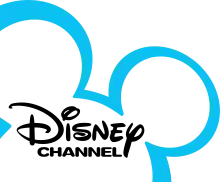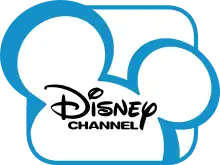 | |
| Country | United Kingdom |
|---|---|
| Broadcast area |
|
| Headquarters | 3 Queen Caroline Street, Hammersmith, London W6 9PE, United Kingdom |
| Programming | |
| Language(s) | |
| Picture format | SDTV 576i (16:9) |
| Ownership | |
| Owner | |
| History | |
| Launched |
|
| Former names | Fox Kids Jetix |
| Links | |
| Website | tv |
Disney Channel (on-air known as Disney Csatorna) is a British-managed[1] Hungarian pay television channel owned and operated by The Walt Disney Company Limited. It is aimed at children and teens. It used to be known as Fox Kids,[2] and later as Jetix.[3]
The channel is broadcast in Hungary, the Czech Republic, and Slovakia, the two latter sharing its feed with a Czech audio track.
History
The channel was launched in Hungary in November 2000 as Fox Kids. One year later, it increased its coverage area to the Czech Republic and Slovakia with the addition of a Czech audio track to the channel. On 18 April 2004, Fox Kids launched Jetix as a programming block, and later, on 1 January 2005, the channel was rebranded as Jetix.
On 11 August 2008, Jetix started broadcasting a block of "Disney stars", featuring the series Kim Possible, Phineas and Ferb, American Dragon, Hannah Montana and later Wizards of Waverly Place. After Disney XD was launched on 19 February 2009 in the US, the Disney-ABC Television Group has started re-branding Jetix channels in all countries. However, in certain countries (including Hungary), Jetix was replaced by Disney Channel, marking that channel's introduction in these countries.
On 8 July 2009, Jetix started broadcasting promotional ads that announced the launch of Disney Channel in Hungary with the series Phineas and Ferb, Hannah Montana, JONAS, Kim Possible, American Dragon and Wizards of Waverly Place. Thus, Jetix was rebranded as Disney Channel on 19 September 2009.[4][5]
On 21 July 2014, the channel adopted the new logo. The channel switched to 16:9 widescreen on 29 January 2015.
On 3 May 2011, Disney Channel Central Europe started using the same and updated on-air logo as in the United States, along with several other Disney Channels across Europe, completing its transitional rebrand to the new look. The new logo has debuted on the Czech feed first, prior to appearing on the UK, German, French, Dutch and Spanish feeds. The Playhouse Disney programming block was rebranded to Disney Junior in the Czech Republic and Slovakia on June 1, 2011.
Since 2012, most of the channel's promos are being produced in widescreen. In December 2012, Disney Channel Central Europe has adapted the same on-air presentation and graphics, with minor differences, used by Disney Channel UK. This update has been fully complete in spring.
In June 2014, Disney Channel Central Europe adapted the new logo currently used by Disney Channel Germany. It started broadcasting in 16:9 widescreen format from 29 January 2015.[6]
On July 1, 2015, Disney Junior launched in Hungary,[7] but closed on December 5, 2017.
Current programming
Live-action
Animated
- Miraculous: Tales of Ladybug and Cat Noir
- Big City Greens
- Boy Girl Dog Cat Mouse Cheese
- Ghostforce
- The Ghost and Molly McGee
- Vikingskool
- The Unstoppable Yellow Yeti
- Chip 'n' Dale: Park Life
- 50/50 Heroes
- Droners
- Taffy
- Bluey
- Hamster & Gretel
- Spidey and His Amazing Friends
- Kiff
- Zombies: The Re-Animated Series
- The Wonderful World of Mickey Mouse
- Olaf Presents
Former programming
Live-action
- K-9
- Wizards of Waverly Place
- Zeke and Luther
- I'm in the Band
- Aaron Stone
- Jake & Blake
- My Babysitter's a Vampire
- Hannah Montana
- Sonny with a Chance
- H2O: Just Add Water
- Jonas
- The Suite Life on Deck
- The Suite Life of Zack & Cody
- Shake It Up
- A.N.T. Farm
- Good Luck Charlie
- Disney's Win, Lose or Draw
- Art Attack
- Crash & Bernstein
- Violetta
- I Love Violetta
- Dog with a Blog
- Mighty Med
- Jessie
- Binny and the Ghost
- Pair of Kings
- Austin & Ally
- Wolfblood
- Spooksville
- Annedroids
- Violetta: Angie's kitchen
- Lab Rats
- Gamer's Guide to Pretty Much Everything
- Lab Rats: Elite Force
- K.C. Undercover
- Liv and Maddie
- Mako Mermaids
- Hank Zipzer
- I Didn't Do It
- Girl Meets World
- Evermoor
- Best Friends Whenever
- Alex & Co.
- Summer Break Diaries
- Stuck in the Middle
- Soy Luna
- Kickin' It
- Bizaardvark
- Bug Juice: My Adventures at Camp
- The Lodge
- O11CE
- Project Mc2
- Mech-X4
- Fast Layne
- Penny on M.A.R.S.
- Coop & Cami Ask the World
- Just Roll with It
- Gabby Duran & the Unsittables
- Kirby Buckets
- Bia
- Once
- Sydney to the Max
Animated
- Doc McStuffins(2013-2015) (Dub title: Dr. Plüssi)
- The Hive(2013-2015) (Dub title: Zümi kalandjai)
- Jake and the Never Land Pirates(2011-2015) (Dub title: Jake és Sohaország kalózai)
- Jungle Junction(2010-2015) (Dub title: Dzsungelélet)
- Mickey Mouse Clubhouse(2009-2015) (Dub title: Mickey éger játszótere)
- Mouk(2011-2015)
- Sofia the First(2013-2015) (Dub title: Szófia hercegnö)
- Monster Buster Club(September 19, 2009-2011)
- The Replacements(September 19, 2009-2012) (Dub title: Cserecsapat)
- The Emperor's New School(October 2009-2012) (Dub title: Király suli)
- Kim Possible(September 19, 2009-2014) (Dub title: Kis tini hös)
- Brandy & Mr. Whiskers(December 7, 2009-2010) (first season only) (Dub title: Brandy és Mr. Bajusz)
- Recess(September 19, 2009-2013) (Dub title: Szünet)
- Fish Hooks(2011-2014) (first 2 seasons only) (Dub title: Pecatanya)
- Lilo & Stitch: The Series
- The Fairly OddParents
- Stoked
- Kick Buttowski
- Kid vs. Kat
- American Dragon: Jake Long
- Timon and Pumbaa
- Sabrina: Secrets of a Teenage Witch
- Whisker Haven Tales with the Palace Pets
- Gravity Falls
- Cars Toons
- The Owl
- Brian O'Brian
- Have a Laugh!
- Toy Story Toons
- Lego Star Wars: The Resistance Rises
- Ultimate Spider-Man
- Boyster
- LEGO Frozen Northern Lights
- Phineas and Ferb
- Penn Zero: Part-Time Hero
- Star Wars Rebels
- Descendants: Wicked World
- Counterfeit Cat
- Wander Over Yonder
- Camp Lakebottom
- Randy Cunningham: 9th Grade Ninja
- The 7D
- LoliRock
- Supa Strikas
- Rolling with the Ronks!
- Sunny Bunnies
- Sheriff Callie's Wild West
- The ZhuZhus
- Star Darlings
- Miles from Tomorrowland
- The Lion Guard
- Lego Star Wars: The Freemaker Adventures
- Elena of Avalor
- Mickey and the Roadster Racers
- Star Wars: Forces of Destiny
- Spider-Man
- Puppy Dog Pals
- PJ Masks
- Star vs. the Forces of Evil
- Tangled: The Series
- Mickey Mouse
- Milo Murphy's Law
- Hotel Transylvania: The Series
- DuckTales
- Kitty Is Not A Cat
- Big Hero 6: The Series
- Star Wars Resistance
- 101 Dalmatian Street
- Sadie Sparks
- Best Bugs Forever
- Supa Strikas
- Amphibia
- Zombies: Addison's Moonstone Mystery
Jetix
- Winx Club (seasons 1–2 only)
Logos
 2009-2010.
2009-2010. 2010-2014.
2010-2014. 2014-2017.
2014-2017..svg.png.webp) 2017-2022.
2017-2022. 2022-present
2022-present
References
- ↑ "Rólunk". Disney Magyarország (in Hungarian). Retrieved 5 December 2022.
- ↑ "Jetix Europe N.V. Annual Review and Financial Statements 2006" (PDF). p. 12. Archived from the original (PDF) on 30 March 2007. Retrieved 20 December 2022.
- ↑ "Financial Results –Six Months to March 31, 2005" (PDF). Jetix Europe NV. 9 June 2005. p. 5. Archived from the original (PDF) on 26 April 2014. Retrieved 20 December 2022.
- ↑ "Jetix to become Disney". Broadband TV News. 26 May 2009. Retrieved 5 December 2022.
- ↑ Disney Channel Hungary Launch 19-09-09 ( reupload ), retrieved 20 December 2022
- ↑ "Disney Channel in 16:9 beginning with January (Czech)". Parabola.cz. 29 January 2015.
- ↑ "Infók a Disney Juniorról". Gyerek-Világ. Archived from the original on 13 July 2015. Retrieved 15 December 2022.
{{cite web}}: CS1 maint: unfit URL (link)